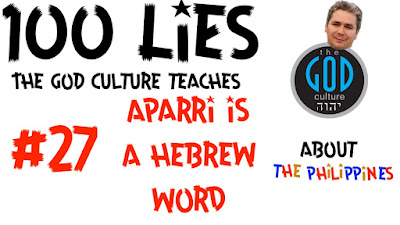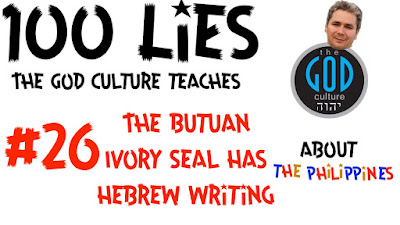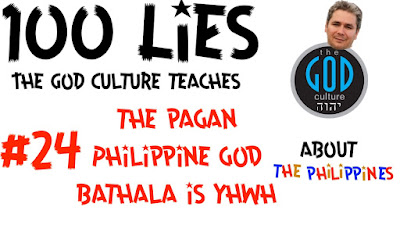Timothy Jay Schwab of The God Culture has been a busy man of late. He has begun once more holding conferences around the nation to delude Filipinos into thinking they are Israelites and that the Philippines is actually Ophir, Tarshish, and Sheba. He has also published a new book in two volumes about the Apocrypha. But before all that he began a new series called "Restoring Creation."
.png) |
| Restoring Creation Series |
This series purports to be restoring the truth about the creation narrative in Genesis 1 and 2. However, far from restoring knowledge Tim is actually vomiting forth enormous falsehoods. This article will detail Tim's blasphemous statements against the Holy Ghost.
The fact is Tim believes the Holy Spirit is not God but a creation and had no role in creation as a creator. This is utter anti-trinitarian blasphemy. I will not be explaining the Trinity or divinity of the Holy Spirit here. This will be a catalogue of Timothy Jay Schwab's blasphemous statements against the Holy Spirit in this series. Remember what Jesus said about such blasphemy:
Matthew 12:31 Wherefore I say unto you, All manner of sin and blasphemy shall be forgiven unto men: but the blasphemy against the Holy Ghost shall not be forgiven unto men.
Timothy Jay Schwab of The God Culture is past the point of redemption and if you follow him so are you.
Restoring Creation: Part 2: Continued... Did Moses Write the First Chapters of Genesis?
35:40 Elohim is the Father and the Son it's plural and it's used because the Father and the Son created.
36:22 Moses wrote Genesis and he wrote Elohim in the beginning because the Elohim he refers to is two, the Father and the Son.
Restoring Creation: Part 3: What Is the Origin of Genesis? Not Sumer or the Occult!
1:27:47 Yahusha said Moses wrote of me. Hello? He did so in Genesis and Jubilees first and actually if we went back even further uh, when it says "In the beginning Elohim said", right, Elohim created the heavens and the earth, well, that word Elohim is there, not God, by the way. It's Elohim in Hebrew and it's plural. It's two. It's the Father and the Son. Some throw in the Holy Spirit uh, we can't find any Scriptures where the Holy Spirit is a creator, but whatever.
Restoring Creation: Part 4: Before Creation? What and When Was "In The Beginning?"
2:13 The Holy Spirit as well was there but we just don't have a defined role for Him at that time. Uh, He's not called Elohim. He's not known to be a creator
13:23 Elohim is plural which means it's more than one. So, there's at least two Elohim at creation in the beginning. But see the angels weren't created yet so this is the Father and the Son specifically. Some try to fit the Holy Spirit into that formula and actually we don't have a problem with that, uh, we just never see that in Scripture He's never equated as Elohim in Scripture, uh, so why would we add something that's just plain not there. We're not gonna do that to placate Church doctrine of men. We don't.
33:19 That's a power reserved for Elohim from the beginning which is plural, it is two.
36:52 When Genesis says in the beginning Elohim, at least two, created the heaven and the earth it means the Father and the Son, John 1 says so. Again, this isn't the only place go to Jubilees and actually Paul also affirms this as well we've covered in other videos. There is no debating that. Again, there are no others even there that would classify as Elohim other than the Holy Spirit who, by the way, is not classified as such. Uh, if that's somehow an oversight in Scripture fine. Uh, He is absolutely a wonderful, beautiful part of this whole formula no doubt. But we don't know what his role was at creation. There's just nothing there for Him. It just says he upon the waters or the face of the deep. That doesn't really tell us anything. Maybe He did something and we're just not seeing it but we're just not seeing it. It's just not there and we're not gonna stretch something that's just not there.
40:02 Again the world was made by Yahusha with Yahuah, Elohim, plural, defined right here again. That's why it's plural. It is a class of only two at that time. So there's not a lot of research that needs to be done to figure out who it was.
Restoring Creation: Part 5: Before Creation? The Occult Narrative Scholars Are Following In Error
23:30 There's nothing except for the Father and the Son perhaps the Holy Spirit though there is no Scripture that says He had no beginning such as Melchizedek, Messiah, or the Father.
26:08 No angels created any of that. No. It didn't happen. It was the Father and the Son. Yes the Holy Spirit was there, too, there's no doubting that. We've never said otherwise. But He's not assigned a role as a Creator nor as Elohim in Scripture. It's just not there.
Restoring Creation: Part 9: Is Darkness Evil? Or Good?
5:24 Again we already proved there is no time period known as before creation. It's just not there. It's fiction. It is occult fiction we proved. And all that was there previously that we know of is the Father and the Son and perhaps the Holy Spirit. We don't know. Scripture doesn't say. It never identifies Him as having no beginning like as the Father and the Son which it does very clearly.
6:18 No Scripture identifies the Holy Spirit though in that vein. It just doesn't. I mean do we follow scripture or do we, do we, like to propagate the doctrines of men and beat people up as anti-trinitarians or whatever stupid word they can come up with? What dumb, you know, illiterate ignorance when the word Trinity doesn't even exist in the Bible so who cares about it. When you see the word, the, the word that is you, you do understand that, right? Yeah I'm pretty sure our viewers do. When you see the word Eternal that does not mean they don't have a beginning understand that as well our Spirits are Eternal right but most certainly have beginning. We were created right? Uh, angels are Eternal but they have a creation point. We're actually going to cover that very clearly on the first day. Uh, it's just not there, uh, you know so trying to take, again, a word, uh, out of its own definition, I mean Eternal doesn't mean they've lived forever it means they will live forever. Um, it does not mean they don't have a beginning. So they see that word Eternal, uh, used in terms of the The Ruach and then they assume oh well that means the Holy Spirit is also from, you know, from before, uh, creation. Right? It actually, no, no it doesn't mean that and it doesn't say that.
Restoring Creation: Part 10: Did Creation Begin In Gen. 1:2? Powerful Revelation!
9:56 So, what elements of creation are present in Genesis? Well, Elohim of course, the Father and the Son really.
10:51 And the Holy Spirit was present and you will notice He is always on the surface of the earth throughout Scripture. Notice that. A lot of times they say oh well the Holy Spirit in Heaven. Woah, woah, wait, wait. The Holy Spirit's not in heaven. That's not Bible. The Holy Spirit generally is on earth. Now we got no role for him at creation, uh, no Scripture calling Him Elohim, it's just not there. Uh, but we'll get there soon too. We are gonna address one, uh, that could be used to try to bolster such although we actually haven't seen anybody figure that out but we figured it out and already we'll show you how that would not be an accurate reading.
Restoring Creation: Part 12: Who Is Elohim? Gen. 1:1 Understood. First Day.
1:39 Well, who then are the Elohim of Genesis 1:1 before the angels were even created? Yes they are called Elohim as well because Elohim is a general term for heavenly being. However, there are no other heavenly beings there is two here actually. There's another being on earth, uh, and there you go, that's it, at creation in the very beginning.
18:59 But who is Elohim? Well, the word is plural at least two in the Hebrew, the "im" on the end makes it plural. Plural means not one but two.
37:37 So, in the beginning Elohim created the heavens and the earth. That Elohim is two. The Father and the Son. Again, the Holy Spirit's there but there's no Scripture that ever attributes the Holy Spirit as a creator. It's just not there. You can try to add it. You can try to say, you know, it's equated in some context somewhere. That's fine go ahead and do that but we don't. We just don't placate those kinds of thinkings. We, we go with what the Bible says. So, that's not His role it just isn't in scripture. If it was His role then show us the Scripture. Well you won't because it's not there.
39:05 But here basically the word Elohim is a generic term for heavenly being. But again, the only beings in heaven at the tome of Genesis 1:1 are the Father and the Son. The Holy Spirit is hovering on the waters. He's on earth which is where he is throughout Scripture. His role is on earth.
51:53 So, Yahusha, the Son, is part of Elohim which is plural for two at creation, the Father and the Son. That is the only who qualify as creators. In the beginning Elohim created, right? Again we'll cover this more but the Holy Spirit is not known as Elohim nor a Creator. It's just not there. He is incredibly important and physically present at creation indeed not in heaven but on Earth where he is found throughout scripture in the Old and New Testaments alike but still that doesn't make him what the Bible never calls Him. He is not the Elohim of Creation in the sense of creating. He just doesn't do that that the text says at all. In the beginning Elohim created does not include Him as such though He is present indeed. We aren't going to force something this important because of, well, illiterate ridicule using an anti-trinitarian label or whatever. Who cares? Which also is a word that, well, never exists in scripture. Oh how about that? Talk about the dumbest of false paradigms. Such inept fools don't even realize the words they use aren't even in the Bible yet they beat people over the head for not using their unbiblical words and doctrines for that matter. Now that's pretty dumb. Wow.
Restoring Creation: Part 13: Where Did the Water and Deep Come From? Gen. 1:2 Understood in Job 26
6:10 And the Spirit of Elohim moved upon the face of the waters. That's the Holy Spirit no doubt. This is definitely Him, His first mention, He was there. He just wasn't a creator according to Scripture. It doesn't attribute that role which is ok, He doesn't have to be. Not sure why they claim that He does. That's ridiculous.
13:08 There's no mention in Jubilees of the Holy Spirit specifically. Uh, Moses doesn't separate him out there, uh, and that may be telling, uh, but we're, we're not sure on that though we'll keep researching. Uh, he mentions all the spirits that serve before Him, uh, which are indisputably angels. Uh, whether the Holy Spirit is included in that we don't know. Uh, that's a topic for another series requiring a lot of research we're not going to touch yet but we will eventually. We'd like to get to that, anyway. We know He was there though and that the Angels weren't yet, uh, at that point on Genesis 1:2. Uh, so if if He was created per se He would have been created before, uh, the Angels not at the same time and certainly not lumped in with them. So, not sure that, that that's the case and He very well may be. Uh, yes he's the Eternal Holy Spirit but Eternal, uh, the angels are Eternal, man is eternal so that doesn't mean that He existed prior to being created if he was a creation like other Spirits. There's just no mention of Him as existing prior and the word Eternal does not denote no beginning, again. So, there's no scripture that really says, okay, and that may actually tell us much.
Restoring Creation: Part 14: Who Is The Light of Creation? Light and Darkness.
14:47 Basically this is a creation miracle from the Light of the World who created all things He and the Father together demonstrating such now.
18:45 I mean how can we read all these things that Yahusha was in the beginning and created and all things were created by Him as well as the Father, uh, nothing was created without Him, and not realize that He's injected into all of this? Of course He is. Has to be because Elohim is the Father and the Son.
20:01 For the glory of Elohim did lighten it. Wow! Ok so you have the Father or the Father and Son, Elohim's plural, right, and that would be the proper Hebrew there even though this is written in Greek. And the Lamb, who is the Lamb? We all know that's Yahusha. And the Lamb is the light thereof. Specifically out of Elohim, the Father and the Son, the light comes from Yahusha.
24:17 Yahuah says, Elohim, really the Father and the Son.
29:48 An era the Bible, by the way, never mentions before creation we've made that clear, uh, except for Yahuah and Yahusha existed, uh, and we're not given a narrative prior to these first six days of creation because we don't need one.
Restoring Creation: Part 17: What Is The Firmament? Second Day
13:09 Genesis 1:6 and Elohim the Father and the Son together
23:49 On the first day Yahuah and Yahusha, Elohim, created seven great works.
Restoring Creation: Part 19: The Flood: Eyewitnesses of the Firmament Second Day
2:54 There is no such thing as concept of before creation other than the fact that Yahuah and Yahusha existed prior. That's it. That's all we find in Scripture. Not even the Holy Spirit for that matter. We don't find that. Doesn't mean that He wasn't we just don't know because it doesn't say.
17:49 It's amazing what Yahuah and Yahusha did in the first days of time.
Restoring Creation: Part 28: Sun, Moon, & Stars. Fourth Day
51:15 The heavens declare the glory of Elohim. Indeed they are the creators and they created the heavens therefore that's how that works. The Father and the Son and yes the Holy Spirit was there present hovering over the face of the great deep, over the earth basically. Uh, we just aren't given a role for Him in creation itself. Doesn't say that He was a creator. Just doesn't.
For the moment Timothy Jay Schwab has paused his creation series so this list is incomplete. But it is more than enough to convict The God Culture of blasphemy against the Holy Spirit. He may not think he is blaspheming the Holy Ghost but what else do you call denying God's Spirit divinity, eternity, and being a creator? The Bible tells us that we are sealed by the Holy Spirit unto the day of redemption.
Are we sealed with a creature? The idea is preposterous.
Paul says we are to pray at all times in the Spirit.
Jude says we are to pray in the Holy Ghost!
Are we to pray to a creature? Of course not!
All the functions of the Holy Spirit as laid out in the Scriptures are that of God and not a creature. To deny His divinity and suggest He is a creation is to commit blasphemy. Timothy Jay Schwab of the God Culture is a blasphemer.






































